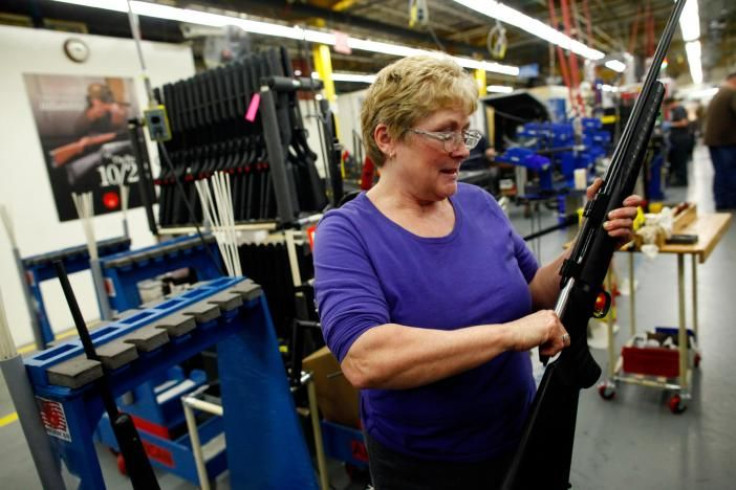Guns For Sale: Under Trump, Will Firearm Purchases Go Up Or Down?

Gun owners were thrilled with Donald Trump's election in November. So were short sellers of gun stocks.
Trump's surprise victory on Nov. 8 turned gunmaker shares, one of the most profitable investments under his predecessor, Democrat Barack Obama, into a top money-maker for traders who take a gamble on falling stock prices.
Shares of firearms makers Sturm Ruger & Company (RGR.N), American Outdoor Brands Corp (AOBC.O) and Vista Outdoor Inc (VSTO.N) are down by between 17 percent and 47 percent since Election Day.
Fears of gun control following mass shootings in San Bernardino, California, and Orlando, Florida, along with concerns a win by Democrats in the November polls could usher in more firearm restrictions, led to record U.S. gun sales last year and propelled firearm stocks to all-time highs.
From Obama's inauguration in January 2009 through Trump's election victory, Sturm Ruger shares delivered a total return, including reinvested dividends, of 1,315 percent, while American Outdoor Brands, formerly known as Smith & Wesson, returned nearly 1,060 percent. Vista Outdoor had risen 14 percent since its market debut in January 2015.
But the victory of Republican candidate Trump, who opposes regulations on gun ownership, abruptly undercut demand as people became less worried the government would curtail their ability to purchase firearms.
The steep drop in guns sales threw gunmakers' shares into free-fall, and privately held Remington, which has been making firearms since 1816, this month laid off 122 workers from its factory in Ilion, New York.
While bets that Trump will cut corporate taxes and slash financial regulation have sent the S&P 500 up 11 percent since the election to record highs, short sellers targeting gun stocks have reaped even richer rewards.
Vista Outdoor gets about half of its revenue from selling guns and ammunition, and a 47-percent slump in its shares since the election puts it at the bottom of a list of more than 2,000 U.S. companies valued at $1 billion or more, according to Thomson Reuters data.
Short sellers have counted nearly $200 million of paper profit betting against American Outdoor Brands and Vista Outdoor over the past four months, and some traders have recently moved out of those stocks and into rival gunmaker Sturm Ruger, according to S3 Partners, a financial analytics firm.
Sturm Ruger's stock has fallen less than its peers in recent months, making it more attractive to short sellers betting the industry downturn is far from over, said S3 Partners' head of research, Ihor Dusaniwsky. A 9 percent recovery in Sturm Ruger in the past week has left its stock down 17 percent since the election.
"Traders think American Outdoor and Vista have hit their targets, and now they're reallocating some of their short assets to Sturm Ruger, thinking that it will catch up to the other two," Dusaniwsky said.
After sales "took a nosedive" around Thanksgiving, it may take three quarters for gun owners to use up ammunition they stockpiled before the election and return to normal buying, Vista Outdoors Chief Financial Officer Stephen Nolan told analysts at an event on Tuesday.
Short-sellers borrow and then sell stocks they think will fall in value, hoping to profit by buying the stock back more cheaply later on and then returning it to its owner.
Short interest in Sturm Ruger & Company in late March rose to 30 percent of its outstanding shares, its highest since 2013. But with most available shares of Sturm Ruger already shorted, traders are paying interest rates as high as 23 percent to borrow new shares, according to Astec Analytics.
In a sign that gun stocks - if not gun sales - may be set to recover, Vista Outdoor, American Outdoor Brands and Sturm Ruger all rank above the 70th percentile in a Thomson Reuters Starmine model that uses volatility and liquidity to predict what stocks are most likely to outperform over the next month.
Federal Bureau of Investigation background checks in February fell 13 percent, the third month in a row of year-over-year declines, according to the National Shooting Sports Foundation. But that drop was less severe than January's 24 percent year-over-year decline. As well, checks from January to February increased 25 percent, a bigger increase than normal between those two months.
"It's safe to say that things are going to be, at least for a period of time, less robust now that Donald Trump is president," said Wedbush analyst James Hardiman. But he said the deep drop in demand in the three months following the election is unlikely to become the norm.
Background checks are the best proxy for data on monthly gun sales, which manufacturers do not publicly release. The foundation strips the data of applications for conceal-carry permits -- typically made by people who already own guns -- to give a better reflection of actual purchases.
(Reporting by Noel Randewich in San Francisco; Editing by Dan Burns, Megan Davies and Andrea Ricci)
© Copyright IBTimes 2024. All rights reserved.











